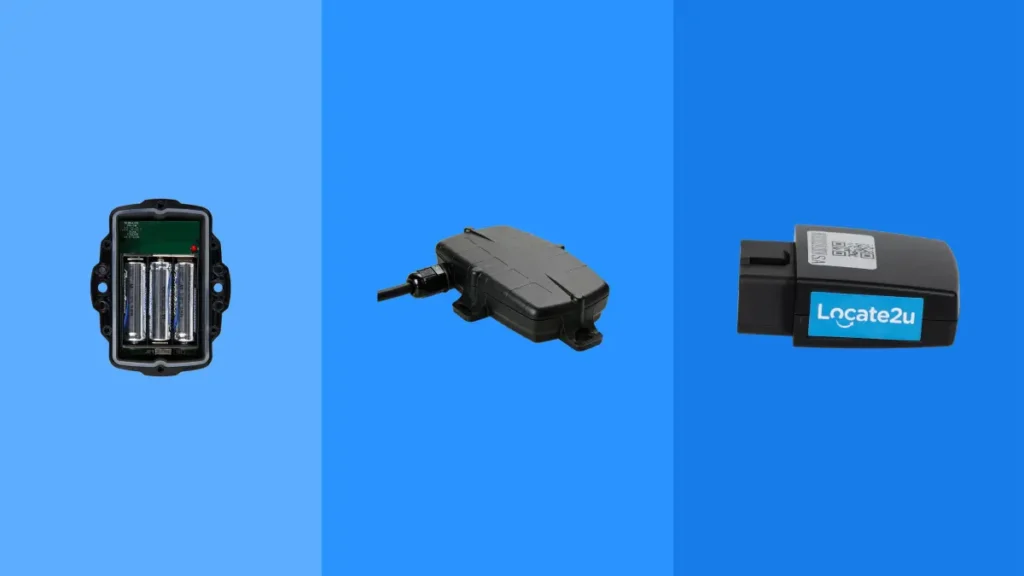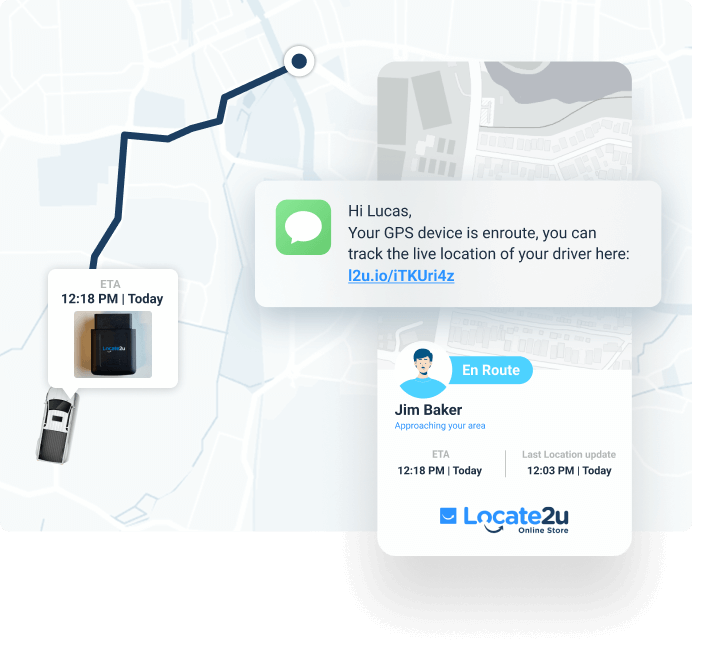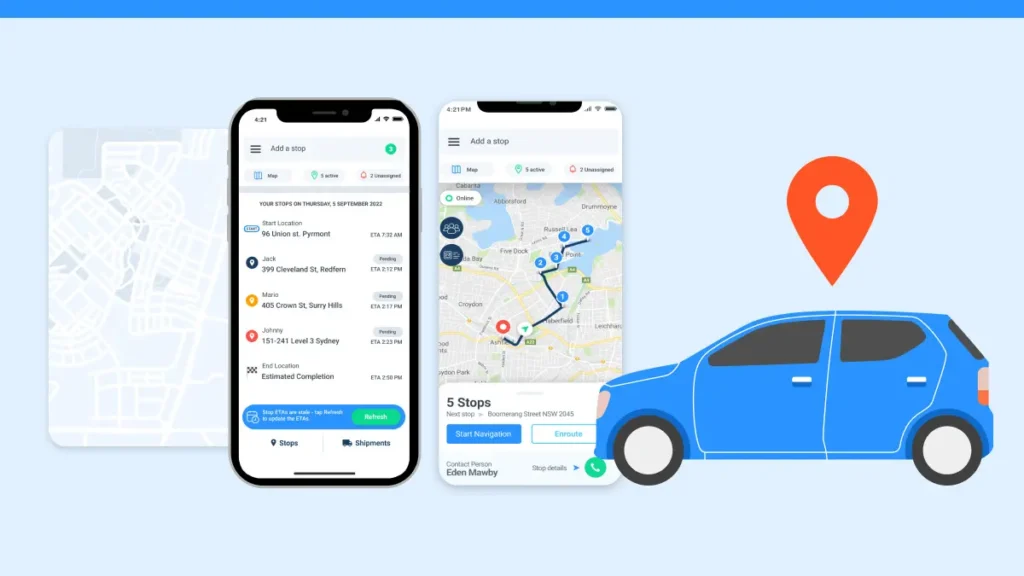You may be wondering how GPS fleet tracking works. There’s a lot of needless mystery around GPS Tracking. Why do people use it? What is GPS Vehicle Tracking? What Is GPS Fleet Tracking? Is there a difference?
This article will answer all these questions about how, why and what GPS is.
Starting off, GPS stands for Global Positioning System and is a fleet management solution that improves your fleet’s safety and productivity.
Businesses need GPS tracking to maintain visibility between them and the driver to improve communication. This creates less confusion if a customer calls up asking for the ETA of their delivery.
What is GPS Fleet Tracking?
Let’s start with what is GPS vehicle tracking.
GPS vehicle tracking devices are installed into a vehicle’s engine so you can see their exact location and driver behavior.
GPS Fleet Tracking systems help businesses see their entire fleet on the map at once and track their location in real time. It also helps provide start and finish times, driver behavior reports, and other useful features that can save your business time and money.

How Does GPS Fleet Tracking Work?
Next is how. So how does GPS fleet tracking work?
The process of GPS Fleet Tracking involves installing a tracking device into a vehicle or asset, where it uses either GPS satellites or SIM cards, like your mobile phone, to determine the vehicle’s location. Regardless of if it’s SIM or satellite-based, GPS tracking sends information from the fleet to the system so businesses can see the fleet’s performance as a whole.
If there’s room for improvement or problems occurring such as theft, you’ve got it covered.
Active GPS Tracker
Active tracking works with cellular or satellite networks and can process and deliver data in real time, relying on consistent connection. It is used for constant monitoring of locations. This type of tracker relies more on storing tracking information which can later be accessed and used for future decisions. This kind of tracking is best suited for vehicles and machines that are used consistently.
Passive GPS Tracker
Passive GPS trackers involve the storage of data at set intervals or triggers such as reaching a specific location or the crossing of geofence. It records data that can be downloaded from the tracker and doesn’t require an ongoing network connection for data transmission, making it a lot cheaper. However, using this type of tracking means you won’t get real-time updates. This kind of tracking is best suited to non-powered assets and machines, such as pallets, that aren’t used or moved often. Using passive GPS tracking on your vehicles could disrupt workflow.
Why Is GPS Tracking Helpful?
Now that we know the answer to ‘What is GPS Fleet tracking?’ We can finally focus on why it’s helpful.
GPS tracking can help businesses save on labor costs by providing accurate start and finish times. This reduces timesheet fraud by helping you keep up with the hours worked by team members so you can pay them the correct amount.
It also helps reduce fuel waste by alerting your business on things such as excessive idling, fuel theft, and inefficient routes. That way you save money and ensure your drivers are being as fuel efficient as possible on the road.
GPS helps businesses improve their driver safety by sharing driver behavior data. That way you can see if a team member has been driving dangerously and help them reduce the likelihood of accidents.
GPS can even help avoid vehicle thefts because of location tracking. This makes the recovery process a lot easier and quicker, eliminating the need to purchase a new vehicle and file an insurance claim.
Benefits Of GPS Tracking For Fleet Management
Reduce fuel costs
Fuel costs are a large expense for businesses. The amount of fuel consumed is dependent on the behavior of your drivers. Speeding and idling excessively will ultimately lead to a significant waste of fuel, forcing drivers to constantly fill up their vehicles more often.
This is a waste of fuel and money and can slow down your driver even though they’re trying to go faster. GPS tracking allows you to see where fuel is being wasted in your fleet, so you will know how to reduce fuel consumption.
Increase Security
Theft is a surprisingly common issue that drivers encounter and can cause severe financial problems for businesses. With GPS Tracking, you can have peace of mind knowing the location of your fleet at all times. If a vehicle goes missing, the visibility of your fleet means you increase the chance of recovery and eliminate the need to purchase another vehicle. Retrieving your vehicle also saves you the time of having to complete a time-consuming insurance claim, which can be a frustrating experience.
Reduce Timesheet Freud
When people ask ‘How Does GPS Fleet Tracking Work?’ this is the most common benefit brought up other than increased visibility. GPS Tracking allows you to view the location of your team and see when they’ve arrived for their first job and left their last job for the day.
This means no more relying on manual timesheets that are filled out once a week. Your business can easily see accurate start and finish times and compare them with the timesheet. This helps reduce timesheet fraud and ensures employees are paid for the hours they actually work.
Driver Behaviour- Less Risk Of Accidents
With GPS Tracking you can monitor the behaviour of your drivers and reduce the likelihood of future accidents. If they’re driving dangerously and speeding, this could cause an accident and potentially harm your business, or themselves. This technology gives you visibility to see the behavior of your fleet whilst they’re on the road and allows you to train them for better use of company vehicles and reduce any reckless driving.
Better customer service
As a business owner, your focus is always to give your customers the best experience possible, which could lead to them re-using your services in the future. A recent Zoom2u study has shown that 78.9% of people would be frustrated if they missed a home delivery. GPS Tracking improves ETA’s, so if a customer calls up wanting to know how far away their order is, you can answer immediately instead of chasing your drivers.

The Difference Between A Cheap GPS Tracking System And A Reliable GPS Tracking System
Sometimes it pays to have something reliable rather than cheap, especially when it comes to GPS Tracking systems. When using a cheap GPS tracking system, you can expect it to have fewer functions, such as real-time tracking. There could also be a range of technical issues that could interfere with deliveries and no support to help you, making it difficult to look after your fleet.
A reliable GPS tracking system gives you peace of mind that your team is where it should be and if there are any issues you’ll be the first to know. It will give you all the functions you need and want such as accurate tracking in real-time. You’ll also don’t have to worry about encountering a multitude of technical issues as you’ll have support available to deal with any troubles.

The Best Asset & Device GPS Tracking System Around
If you’re looking to improve your fleet’s performance then Locate2u is the reliable solution for your GPS tracking needs. Its accuracy will help improve your ETA’s and give customers a better experience as they’ll know when their order is arriving. You can also access route replay to review past deliveries, reducing the possibility of timesheet fraud and dangerous driver behavior, whilst increasing the security of your fleet should a vehicle go missing.
To see our GPS tracking device range, click here
To see how we can help your business in a live demo, click here












